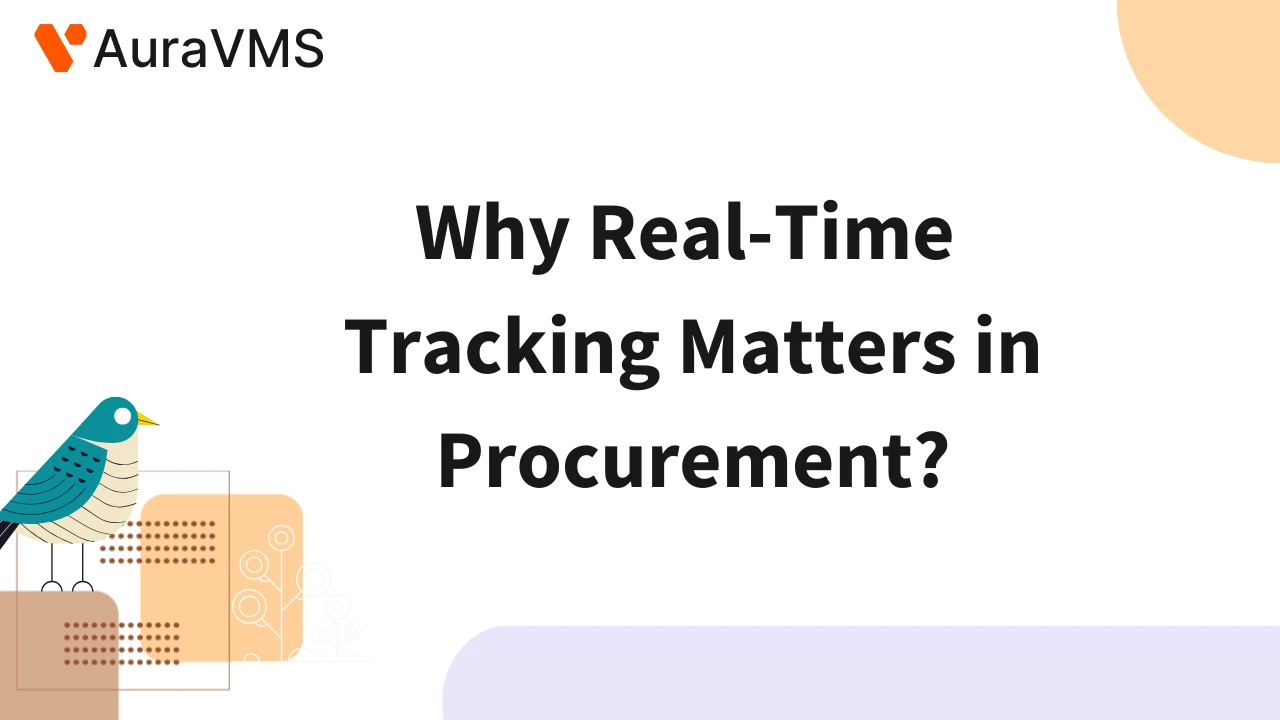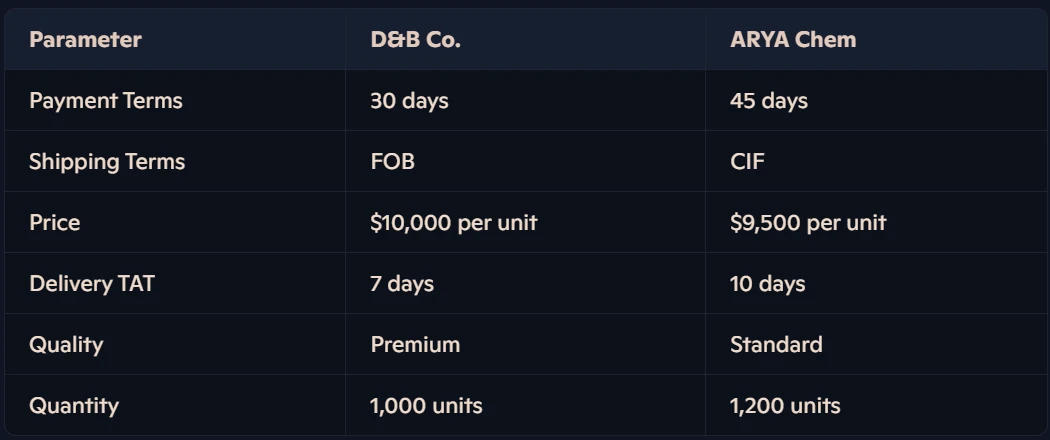The Future of Supplier Relationship Management: Trends to Watch
25 abr 2025
Supplier Relationship Management (SRM) is no longer just about managing suppliers; it's about building long-term, mutually beneficial relationships that drive business success. In an increasingly competitive and fast-changing business environment, SRM is evolving. If you're responsible for procurement or supply chain management, it's essential to stay ahead of the trends shaping the future of SRM. In this blog, we'll explore the key trends that are redefining Supplier Relationship Management and how your business can leverage them to improve efficiency, reduce costs, and strengthen supplier partnerships.
Publicado Por AuraVMS
The SRM Shift: Why Supplier Relationships Matter More Than Ever
Suppliers are traditionally focused on transaction, value interaction and timely delivery. However, business today understands that strong suppliers give rise to better cooperation, innovation and shared development.
Let's take a look at important trends to look into SRM that will shape the future of purchase and supplier participation.
1. Digital Transformation: Automating Supplier Interactions
There is a revolution in digitization how business suppliers manage relationships. From the management of SRM software contracts to trekking performance, the supplier is becoming an essential tool to automate many aspects of interaction. Elite the automation processes, reduces errors, and the entire supplier provides real -time visibility in the network.
Why it Matters:
Rapid Decisions: Automatic workflows reduce manual intervention, enabled quick reactions.
Increased Accuracy: Data is automatically captured and processed, reducing human errors.
Better Supplier Insight: Real -time data supplier helps assess the performance, helps businesses to make informed decisions.
2. Data-Driven SRM: Leveraging Analytics for Strategic Decisions
Data analytics supplier is changing SRM by providing valuable insight into performance, risk management and cost optimization. With the right equipment, businesses can analyze large amounts of data, receive action in areas such as supply chain risk, performance trends and cost-saving opportunities.
Why it Matters:
Proactive Management: Predictive Analytics helps businesses to remove potential disruption and take active measures.
Informed Decisions: Data-driven decisions give rise to more efficient and cost-effective supplier management.
Better cooperation: Analytics helps align business goals with suppliers, promotes better cooperation.
3. Supplier Collaboration & Co-Innovation: From Transactional to Strategic Partnerships
The future of SRM is moving towards cooperation and co-innovation. Suppliers are no longer seller; They are the major partners in product development, process improvement and market expansion. Businesses are focused on building deep, long -term relationships with suppliers based on confidence, shared goals and innovation.
Why it Matters:
Better Product Quality: Cooperative relations lead to joint product development, ensuring high quality.
Rapid innovation: By working with suppliers, business can accelerate innovation and bring new products to the market faster.
Strong flexibility: Strategic partnership helps create a more flexible supply chain, which is better equipped to handle disruption.
4. Sustainability & Ethical Practices: Aligning Supplier Goals with Corporate Values
Since stability becomes equally a priority for consumers and businesses, the supplier relationship management is developing to reflect these values. More companies are giving priority to permanent sourcing, moral labor practices and environmental responsibility in their supplier selection and management processes.
Why it Matters:
Brand reputation: Consumer cares about stability, and aligning with your corporate values enhance the reputation of your brand.
Regulatory Compliance: Ensures to meet global stability standards that the business remains in line with rules.
Long-term stability: Cooperating with environment-conscious suppliers can lead to long-term cost savings and environmental benefits.
5. Risk Management: Enhancing Resilience through SRM
In today's unstable market, risk management is an important part of SRM. From geopolitical issues to supply of chain disruption, businesses need to be fit to identify and reduce risks. Integrated risk management tools in SRM platforms help businesses to monitor suppliers performance, identify potential risks and ensure continuity of supply chains.
Why it Matters:
Rapid response to disruption: Real -time risk monitoring allows businesses to react quickly to potential issues.
Miscellaneous supply chain: Businesses can bring diversity to their supplier base, reduce dependence on single supplier and reduce risk.
Increase in supply chain transparency: Better visibility in suppliers operations enables businesses to recognize and reduce risks before growing.
6. Supplier Diversity: Building a More Inclusive Supply Chain
The supplier variety is getting a significant focus in modern SRM. Many companies are demanding a variety to their supplier base, working with small, minority -owned and women owned businesses. The supplier variety not only promotes inclusion, but also enhances innovation and strengthens the flexibility of the supply chain.
Why it Matters:
Comprehensive innovation: Miscellaneous suppliers bring new approaches and innovative solutions.
Strong community relations: Supporting minority-ownership and local suppliers can strengthen relationships within your community.
Better brand image: Companies focused on diversity can increase their reputation as responsible corporate citizens.
7. The Rise of AI & Machine Learning in SRM
Artificial Intelligence (AI) and machine learning SRMs are transformed by future insight and automatically complicated processes. AI-driven SRM equipment suppliers can analyze historical data to predict performance, identify risks and optimize purchase strategies.
Why it Matters:
Increased forecast: AI helps predict future trends and supplier behavior, allowing businesses to be ahead of the curve.
Increased efficiency: Machine Learning algorithms can automate repetitive functions, free resources for strategic activities.
Better decision making: AI provides data-powered insight that helps businesses to make smart supplier options.
How AuraVMS Supports the Future of SRM
AuraVMS is already designed to address these emerging trends in supplier relations management. Here's how AuraVMS aligns with the future of SRM:
Digital and Data-Placed: AuraVMS centralizes all suppliers data and automatically automatic SRM processes that provide business with insight that they need to make informed decisions.
Collaboration-First: AuraVMS promotes cooperation with suppliers, improves communication and ensures that everyone is align.
Sustainability and Compliance: AuraVMS helps businesses to track performance performance in terms of stability, ensuring that the supply chain remains moral and environmentally responsible.
Risk Management: AuraVMS provides real -time supplier performance tracking, ensuring that businesses can reduce risks before growing.
The Future Is Now: Embrace the Trends Shaping SRM
Suppliers relationship management is developing, and businesses must be suited to remain competitive. Companies can create strong, more flexible suppliers relationship, embracing data-operated decision making, cooperation and stability.
Are you ready to proof your Supplier Relationship Management strategy?
Start your free trial today app.auravms.com/signup
Questions? Contact us https://www.auravms.com/contact































































